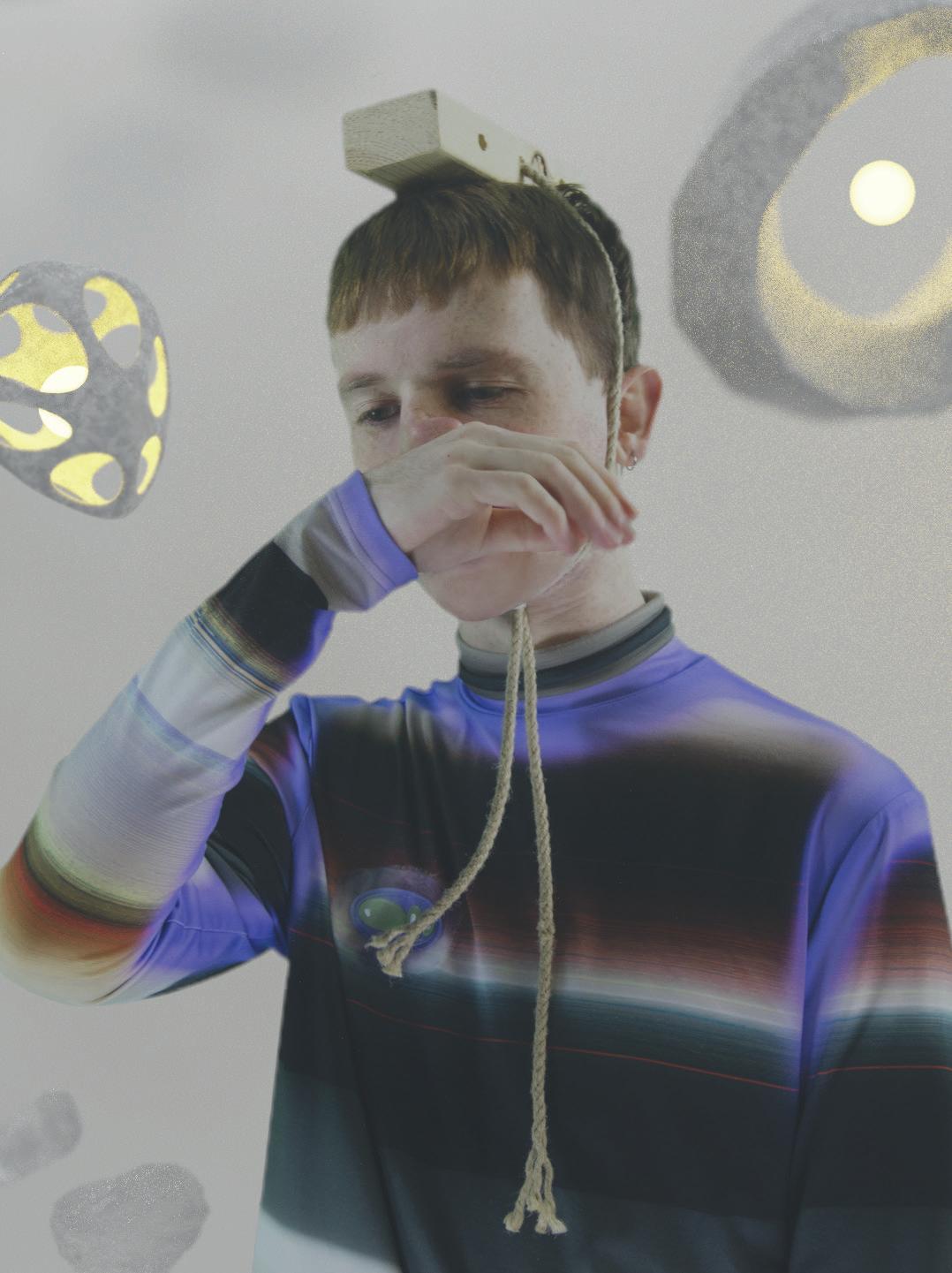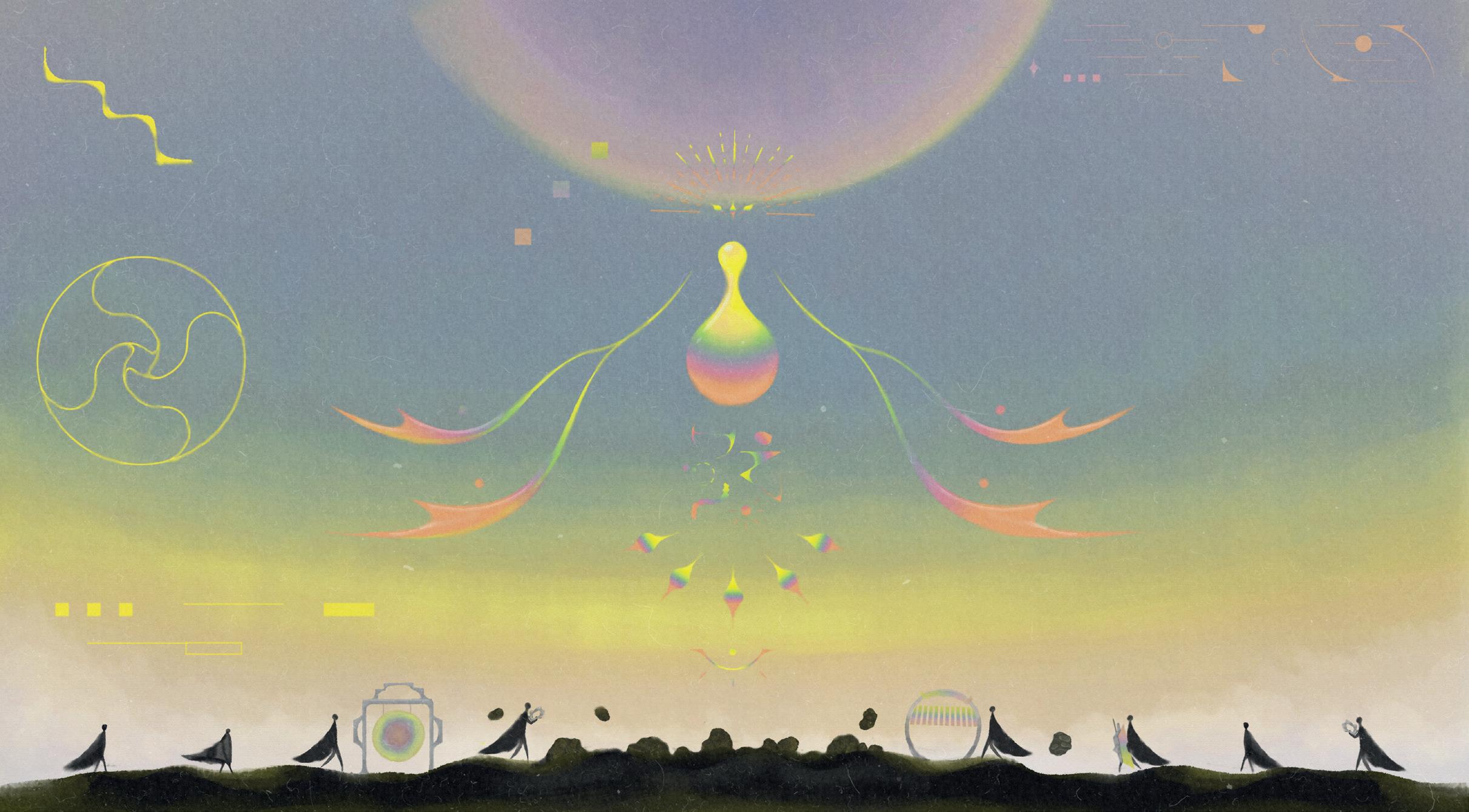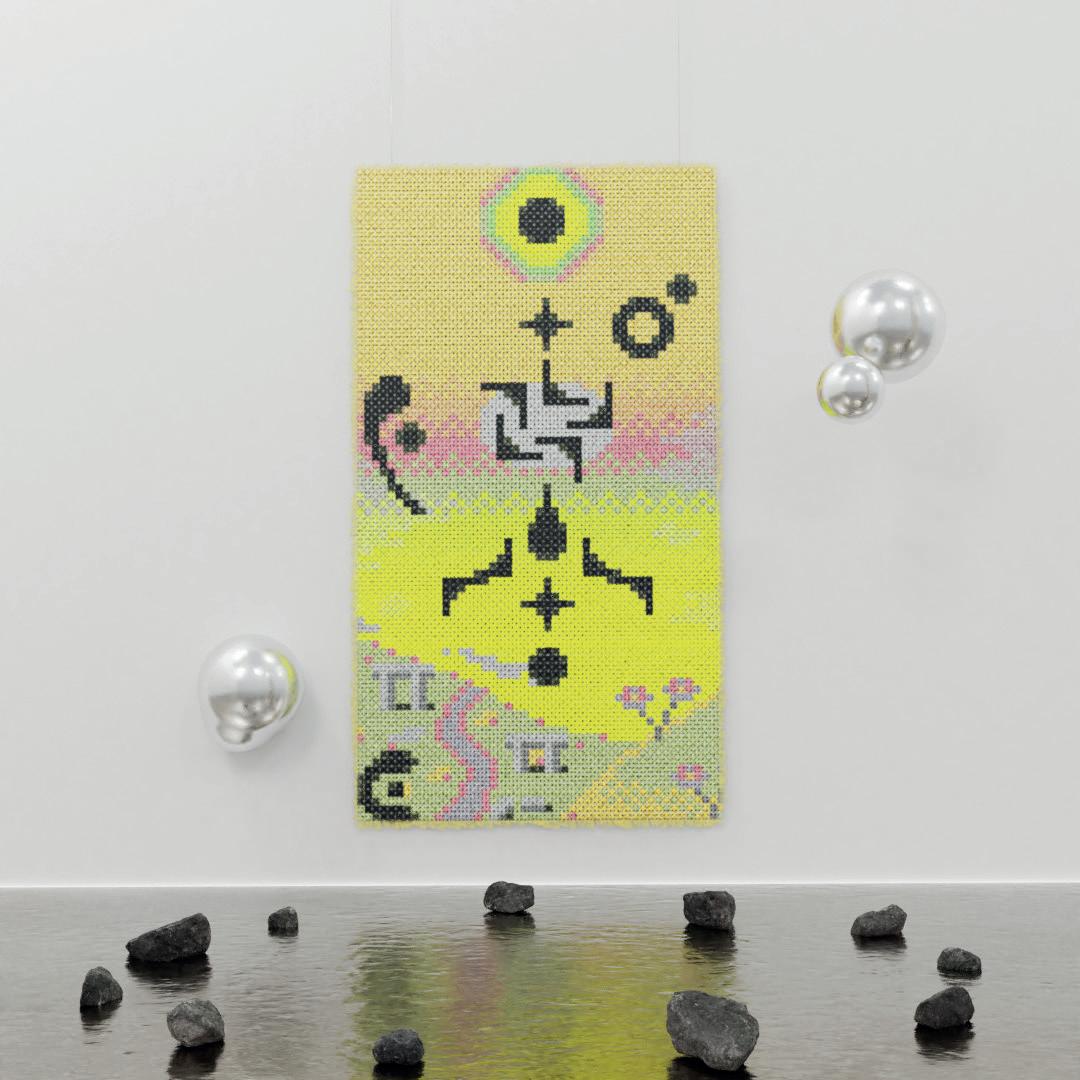
14 minute read
Iglooghost
The Universe is Expanding
Builder of worlds Iglooghost has completed his second solo album of mind-bending computer music. But Lei Line Eon – a dramatic shift from his warp speed electronics of the past – is of course so much more than that, as he tells Skye Butchard over Google Chat
Advertisement

Iglooghost proudly makes laptop music. The abundant universe of characters and huge genre-smashed sounds that fill up his multi-sensory musical world all came together while staring into a screen. These are alien vistas so vast and believable that it’s surprising to know they came together on a Macbook. It’s art piece, magic trick and in-joke rolled into one. But there’s always been a beating organic heart at the core of Iglooghost’s music – sometimes a strange, alien heart beating twenty times a second, but a warm-blooded one nonetheless. His second full length solo album emphasises the warmhearted pull of his music. It’s teaming with gentle piano lines, sweet lilting vocals, and gorgeous violin arpeggios from Vivek Menon. The drums, while lumbering and gigantic, are surprisingly minimal. Quiet hand claps are used just as much as 808 wubs. Fans will know he is as influenced by delicate Steve Reich pieces and the Breath of the Wild soundtrack as he is by hyperactive bass music. Combining those two worlds so intuitively has long been part of his skill as an artist. But it’s not enough for him to merely combine separate musical worlds. Lei Line Eon is part of an ever growing Iglooghost Extended Universe that tells the story of tiny gods from another realm, capable of magical acts far beyond our understanding. Now, thanks to his documentation of strange phenomena in his hometown in Dorset, we’re finding out more about how their existence overlaps with our own. It’s an album about the magic right there in front of our eyes. The music and deep visual material surrounding it is presented with childlike glee – and by extension, half of the fun with Iglooghost remains allowing yourself not to question where fact becomes fiction. After 2019’s bombastic and gloriously silly Gloo album XYZ with his closest musical companions Kai Whiston and Babii, Lei Line Eon is a more reflective and spiritual release, without losing any of Iglooghost’s mysterious charm that filled his 2017 debut, Neō Wax Bloom; a record about a gelatinous worm in a witch hat named Xiangjiao. I interviewed him back then, in a conversation that switched from the telephone to Google Chat within its first few minutes. This time, we went straight for the text option, for me to learn more about the strange lost tradition that he’s been documenting in Dorset; the latest add-on pack to the Iglooghost universe.
Skye Butchard: How have you been over lockdown?
Iglooghost: It’s been hazy and weird and okay. I think I’ve made the most shit I’ve made in my entire life, because there’s no way to switch off. I live in a weird secret converted MOT garage with my gf that doubles as a studio space, so I think the work/ home dynamic is blurred from the jump. I finished my album in lockdown but now I’m addicted to making microscopic void dwelling angels on Blender, and the album feels like a million years ago.
It’s definitely added a lot of petrol to the fire, and turned me into a hyperfocused recluse, which is probably the same for a lot of people whose personality type teeters into that kinda thing. I just wanna see how far this shit can go.
SB: That was actually something I was going to ask you. I remember back when Neō Wax Bloom was coming out, you said your work process was pretty intense. You were constantly creating. It’s like a lot of people in the world are in that headspace now. Do you still find moments for downtime?
IG: I’m a muppet and I haven’t learnt shit! I remember distinctly leaving a note for my future self when I finished my first LP when I was, like, 19 that I should never do that again. You go outside and swim in waterfalls, but before you know it you’re back in the dungeon getting loose off your own fart gas and fucking your spine up from staring into a dim LCD screen. I definitely didn’t follow my own advice. But I do think the process feels different the more hurdles you jump. I work so much faster now and can divide up the things that pop into my head way quicker. Making stuff seems to advance in this weird exponential vortex where the more I grind the faster everything works & even more dopamine-inducing it gets. I was a dumbass when I made my first album so it just felt so sluggish – and I definitely wasn’t aware that it gets faster and faster. I thought it was gonna be boring slow motion shite forever!
SB: I wanted to ask you about Lei music. A lot of people might not be familiar. Can you tell me a bit about that tradition? IG: Lei music is a weird subgenre that’s been practiced around where I was born in the west country for eons. My mum and dad and almost everyone I grew up with screw around with

it to a varying degree. It’s essentially a type of music that toys with using specific combinations of sounds and arrangements to summon these strange morphing inkblot beings. When the music is played with specific sequencing and combinations, different entities appear, and their appearance corresponds with the music. It’s nuts, but doesn’t really get spoken about outside of Dorset. There’s a huge amount of scene history and lost material that just hasn’t been researched properly, so I’ve been using all this new free time to try and do it justice.
SB: What’s that documenting process been like, for you?
IG: So I had to build a physical research space with some mates and it’s called the Gylph Institute. Took a long time, but it’s a good location to post up in – it kind of looks like a humongous shiny nautilus shell building. Lots of windows too. We’ve been trying to reverse engineer Lei Music techniques and figure out how this shit actually works in controlled test domes, but we still manage to smash a lot of shit up by accident. I’ve been archiving tons of musical notation too – it’s all super bizarre with these sprawling scribbly gylph zaps and blots. We’ve got a lot more to figure out but I’ve been periodically publishing my findings on the Glyph Institute site.
SB: What’s a Lei Disk? I hear there’s a whole trading circuit?
IG: Lei Disks are the medium that the music is stored on. Nowadays they generally look like credit card size, see-through little data chips with iconography and splashes of colourful decals, but they’ve changed throughout history. Some of the Disks we’ve managed to reconstruct range from woven tapestries to coral etching. They play back the music and a miniature recording of the summoned entity, almost like those old music boxes with a little ballerina toy – I forget the name. They also get traded around seedy black markets and hoarded on P2P trading networks – shit is a blast.
SB: It’s obvious how huge of an undertaking the project has been, thanks for uncovering all of this! Lore has always been a big thing in your music. Are you someone drawn to deep lore dives as a fan, too?
IG: I think lore can provide rich, dizzyingly complicated networks of storytelling and mythology, but is also often used for cynical never-ending franchise cash-grabs. I think mainstream cinema is saturated with a really nefarious and boring type of lore – just huge mega corporations who own IPs and rehash another pointless prequel/origin story every other year to cash in on nostalgia. ‘The year is 2025 and Netflix Presents – Paddington 9: Untold Legends’. Saying that, I literally woke up to a tweet from Warner Bros announcing a fucking Willy Wonka origin story movie this morning. I can definitely see this becoming a trope people get proper sick of in the next few years & I hope it leads to people seeking refuge in new stories.
SB: Why does every character need a gritty origin story as well? It sucks out a lot of the magic and mystery. One thing that stands out to me about your storytelling is that you balance mystery and deep detail. How much time do you split between the sound and everything else to strike that balance?
IG: That’s sweet, thank you! I am really drawn to that liminal space between a complicated story and a fever dream. I love the idea of revealing the tip of a complicated nexus but intentionally leaving modular/interchangeable gaps in specific places. I think it makes you feel like a baby. Balance-wise, I used to worry that developing visual work around music kinda clamps everything into these strict inter-related parameters, but I’ve kinda come to realise making compelling music is a contrived process anyway. People talk about uncompromised expression but I genuinely think if I just have free-range in a DAW, I end up making drill beats with kazoos and 4x4 kicks and Red Hot Chili Peppers guitar licks cos it’s funny and immediately gratifying. These days I’m either making mind-bendingly thoughtout multimedia work or deranged forbidden cathartic joke music with my mates. I think by doing that it lets your brain exercise everything it wants to do. Maybe there’s something cool in between though.
SB: Was what you made with Gloo part of the former? Have Kai and Babii been a big influence on this project, or is this more of a solo thing for you?
IG: Obviously our bread and butter is making really longform concept driven stuff, but the Gloo stuff definitely scratches an itch that would be kind of off-topic in our solo shit. I think when Soundcloud was popping, there was always this fun but competitive arms race between everyone, where kids were just trying to make the most immediately alarming and unexpected beats. You’d press play and shit would drop immediately into some kind of overly bass-boosted, warped neo-Timbaland shit that sounds like a punch in the jaw. Obviously nobody was really making albums, but that was fine because this shit served a way different short-form, bite-sized purpose. People even tried to get their waveforms looking absurd –like I’d always be clicking on tracks with enormous silent gaps and drastic peaks because even visually it looked mad, and that’s when you knew it was gonna slap. I think that’s what the Gloo shit is – it’s like just weaponised dumb ass beats that you smash shit in your bedroom to.
SB: There’s a real grounding of nature on the new album, and also a unique take on folk stories and spirituality. What’s your own relationship like with your hometown, and what made you want to explore something with grounding on earth?
IG: I feel like when I was a kid, my inner world was always competing with whatever mundane scenario I was actually in, and I think it’s the same for a lot of people. You can almost project/compose crazy fantasies into your actual vision in a way that feels like a locked-off feature as an adult. The place I grew up now feels like a big, used canvas for all that stuff, and even just smelling the air of bonfires & cow shit gives me intense flashbacks to stuff that never actually happened.
SB: There’s a definite sonic continuity on the new album that really connects everything. How quickly did you settle on the ideas for the sound of it? And were there a lot of ideas left on the cutting room floor?
IG: I’ve got like three albums in the bin that were supposed to be LP2. One of them was called New Gėn, and I guess it got so far that people online knew about it & were collecting snippets and bits from it. I think a huge part of the process was wrestling with all my older shit and trying to make something that worked next to it that was still exciting to me. Eventually, I started to feel like it was dumb and redundant as hell to be like 23 and trying to make art based on what I thought was cool when I was 18. I think it’s bizarre and boring that the first thing you make that clicks publicly usually has to dictate your work forever. There was a point where I just deleted the albums I was working on and approached it as best I could without preconceived notions of what I was supposed to be doing. And weirdly, it doesn’t even feel fully inappropriate. I guess there are archetypes and motifs that you subconsciously orbit around... so I think there’s a few things that ended up connecting with the first era of my stuff. Wish I knew that from the fucking start though. Hahaha, whoopsie! This album is definitely obsessed with weight and hyper slow motion though, so I know a good amount of people who want the ADHD warp speed shit are gonna be fuming. I am so glad it exists now though.
SB: From the outside looking in, it feels like you’ve cultivated a fanbase that can appreciate new sounds and ideas, so I do hope they connect with it. A lot of the tracks here definitely are more subtle and neo-classical influenced. Were you nervous putting that out given people know you for the beat-oriented stuff?
IG: Yeah I’m shitting it! I’m curious how people in different terrains & worlds think about it. I find it impossible to detach it from big wet chalky valleys & smoky bonfire druid air, so I don’t know what the fuck someone in LA is gonna associate it with. Sometimes I divide music I make up into the category of whether my mum or my dad would like it. My mum likes expressive twinkling pianos and spindling harp arrangements, and my dad likes big loud brutish distorted obnoxious bangers. This album’s for my mum but maybe the next one will be dad music.
SB: The tools for music creation are getting more and more accessible, and reaching out to artists is easier than ever with stuff like Twitch and Discord. What advice would you give to a young kid who’s maybe overwhelmed about where to start with beatmaking?
IG: I think shit is becoming near open-source at this point, and the elite few who used to hold the keys to making techy morphing shit don’t really hold any power or clout in doing so now. Even like 2 years ago it would be pretty unthinkable to share a project file or stems with a release, but now that’s just another normal part of the process. It’s a bit extreme, but I see people getting called gatekeepers for not sharing their stems. That said, I’m well into it though. Fuck it – everyone’s working so fast and efficiently like a hivemind right now. I do think in this newer era where myself and my closest buds have all started sharing our tools, I wonder what it must be like on the receiving end at square one. It’s probably mad enticing to just hop straight on Splice and bust 99999 credits on hyper-textural mutating 2030s sound design before you can even compose a track. I guess I’d just highlight the fact that it’s a huge superpower to be able to compose boring mundane beats before anything else. I think you can always hear when someone’s trying to run before they can walk, and it’s proper important to have a grasp on basic sequencing and manipulation so you can do your own thing with this abundance of tools. I promise learning the boring shit only takes like four months though! As soon as you can make convincing mediocre music then you’re absolutely fucking on to something.

Become a member of Loud And Quiet
Loud And Quiet is powered by its members, who share our belief that independent music and journalism are worth protecting. By becoming a member you’re valuing what we do and the artists we feature; in our pages, on our site, and on our podcasts.
It works out at less than £1 per week to receive a whole world of new music over the next 12 months, including:
1. Our next 6 magazines delivered to your door 2. The digital editions of our next 6 magazines, including downloads 3. Our members-only Sweet 16 podcast 4. 10% off our monthly selections at DRIFT Records 5. Our members-only playlists on Spotify and Apple Music 6. The Loud And Quiet leather bookmark (feel free to opt out on checkout) 7. The Loud And Quiet die-case logo pin 8. Entry into our Albums of the Month vinyl draw 9. Updates and discounts on merch from us and our friends
6-month subscriptions now available
Sign up at www.loudandquiet.com/subscribe










